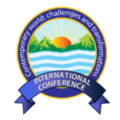
Dr. Sarwat Rauf
Associate Professor
Department of International Relations
National University of Modern Languages (NUML), Islamabad.
Short Bio: Dr. Sarwat Rauf is currently an Associate Professor in the Department of International Relations, National University of Modern Languages (NUML), Islamabad. She is also Research Scholar (Visiting) at Sigur Center for Asian Studies, The Elliott School of International Affairs (ESIA), George Washington University (GWU), Washington DC, US. Her previous experience includes: Assistant Professor Department of International Relations, National University of Modern Languages (NUML), Islamabad and Lecturer International Relations at the same university. She has also worked as lecturer/ Program Coordinator in the Department of Defense and Diplomatic Studies, Fatima Jinnah University Rawalpindi and Research Associate, Ford Peace Project as Visiting Associate at Sustainable Development Policy Institute (SDPI), Islamabad, Pakistan (2002). She is also the member Departmental Board of Studies (BOS), Department of International Relations, NUML, Islamabad.
Besides this, Dr. Sarwat Rauf has also contributed some chapters in different boos which include, “Sino-US Geopolitical Competition: Implications for Pakistan” Conflict and Cooperation in South Asia: Role of Major Powers, (Islamabad: Islamabad Policy Research Institute) and “The Overview of Qingdao SCO Summit: Emerging Opportunities and Challenges for Pakistan”, Post Qingdao Shanghai Cooperation Organization Summit: Emerging Opportunities and Challenges for Pakistan, (Islamabad: Institute of Peace and Diplomatic Studies, 2018). Moreover, Dr. Sarwat is also the member of different organizations which include: The American Institute of Pakistan Studies (AIPS), Alumni Association of NSW (AAN), National Defence University (NDU), Islamabad, and International Exchange Alumni Network, Bureau of Educational and Cultural Affairs, US Department of States.
Keynote Topic: Social Challenges in 21st Century
The twenty first century started with diverse challenges worldwide. The problems of hunger, inequality, environmental pollution, new armed conflicts, religious extremism and terrorism have become serious threats to human beings. The ‘war on terrorism’ has given birth to a changed security environment with severe effects on international norms and human rights. The environmental degradation has brought about new patterns of migration in which gender and poor class have become the targets for disadvantage. An increasing inequality between the world’s rich and poor has raised questions to the advocates of globalization. In these circumstances, it is thought that democracies would find all the solutions of problems. However, the subject of ‘democracy’ which was once celebrated, after the end of Cod war, now receives a more mixed view. There are emerging signs of uncertainty in democratic systems in different countries. The legitimacy of democratic systems has become controversial which is measured by public surveys worldwide. It appears that dissatisfaction with democracy will lead to its collapse under the strain of social conflicts. Moreover, the police and military dimension of security has also been becoming questionable since the outbreak of COVID-19. The international impact of the COVID-19 crisis was heterogeneous, with substantial implications for crisis management and policy responses. The traditional concept of state and security has been failed in determining the plan to get rid out of the pandemic. A new realization is the promotion of science and technology and adaptation of new means of security. Notwithstanding the rise of formidable challenges, this century has been witnessing some positive developments too such as fast communications, new social movements, the development of worldwide opportunities for networking and improved regional cooperation. Thus, the dire need of time is to prepare next generation for the innovative and different world. The trends of ‘tech’, ‘innovation’ and ‘talent’ are growing very fast; therefore, we have to be ‘future-ready’ nation.
